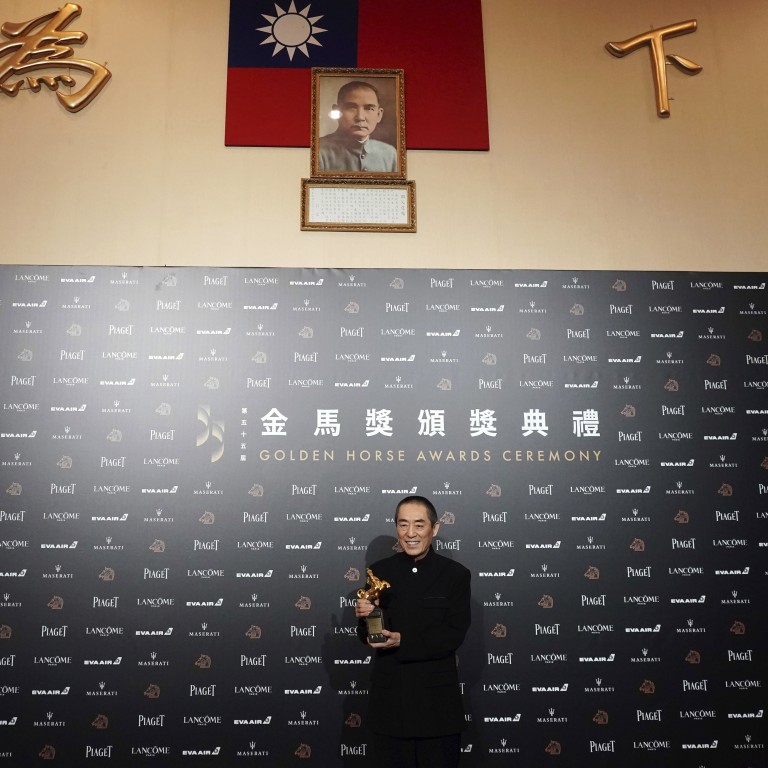
Chinese-language film world split as Taiwan counts down to Golden Horse awards
- Cross-strait divide forces movie industry to take sides as mainland schedules Golden Roosters for the same night
With cross-strait relations at a low, Beijing has decided to hold the mainland’s Golden Rooster awards on the same day as the prestigious Taiwanese event for Chinese-language films.
The Golden Horse organisers have also chosen not to have hosts for their presentation ceremony this year, after Taiwanese documentary director Fu Yue voiced support for Taiwanese independence as she picked up her award in 2018.
Beijing’s Taiwan Affairs Office attributed the boycott to the frosty state of cross-strait relations, but analysts said it was also a response to Fu’s statement.
Golden Rooster vs Golden Horse: how top film awards in China and Taiwan could be in direct competition
Beijing claims self-governed and democratic Taiwan as its own territory, and sees any actions or rhetoric about independence as crossing its political red lines.
In addition, the upcoming presidential elections in Taiwan in January have fuelled tensions across the Taiwan Strait, with Beijing concerned that re-election of incumbent Tsai Ing-wen would further embolden pro-independence forces on the island.
This year is the first time mainland filmmakers and actors have been effectively barred from the Taipei event since Taiwan first opened it up to cross-strait participation in 1996.
Several Hong Kong production companies also said their movies and stars would not take part in the Taipei awards, and Hong Kong filmmaker Johnnie To Kei-fung stepped down as the Golden Horse Film Awards jury chair.
Mainland documentary director Zhu Yu had earlier seemed ready to defy the boycott, but later withdrew herself and her film Young People Question Taoism, saying her safety was threatened by rumours that she would still take part.
Organisers for the Golden Roosters said the biennial event hosted by a different city each time would now be held annually and permanently in the coastal city of Xiamen, across the strait from Taiwan.
Chris Berry, professor of film studies at King’s College London and a specialist in Chinese cinema, said Beijing was trying to overshadow the Golden Horse awards, with most filmmakers having little choice but to attend the Golden Roosters due to the size of the mainland film industry and market.
“Clearly, Beijing wishes to eclipse the Golden Horse with the Golden Rooster,” Berry said. “More menacingly, it is forcing the Chinese-language film world in general and [mainland] filmmakers in particular to choose between Beijing and Taipei. So, this is ‘cold war’ politics again.”
Could the Chinese film industry be the biggest loser from Beijing’s ban on Taiwan’s Golden Horse Awards?
He said there could be further fallout for Taiwan’s cultural sector as the tensions continued, but Beijing was “not as inclined to barge right in as it used to be”.
“It’s more likely they’ll take it slowly and see what the impact of their actions on the Golden Horse is first – unless, of course, Taipei does something they consider ‘provocative’,” he said.
Kristina Karvelyte, assistant professor at Ming Chuan University in Taipei, said she doubted whether the Golden Roosters could match the Taipei event in prestige soon.
Karvelyte said Beijing’s move was an intentional challenge to Taiwan’s Golden Horse awards, but that the Golden Roosters were unlikely to gain the same international recognition due to “censorship and other freedom of expression challenges in the mainland”.
“If it happens that due to growing tensions in cross-strait relations, the awards were no longer to ‘qualify’ as the ‘Chinese Oscars’ in the future, this would be a huge loss for the whole Chinese-speaking world, not only Taiwan,” she said.

